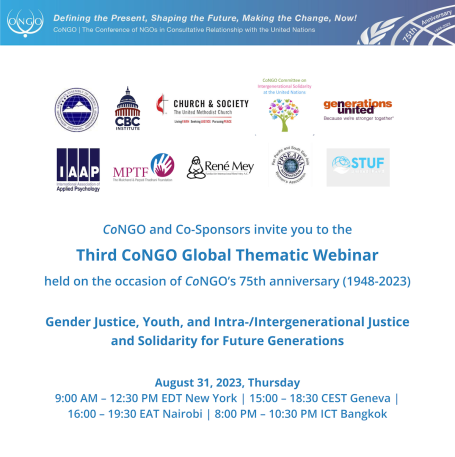
In commemoration of its 75th Anniversary in 2023, the Conference of Non-Governmental
Organizations in Consultative Relationship with the United Nations (CoNGO) organized six Global Thematic Webinars on global issues that constitute the core of ongoing programs of non-governmental and civil society organizations. PPSEAWA was one sponsor of these webinars. The hybrid format of these webinars attracted over 3,500 participants worldwide.
- The first Global Webinar (2 March 2023) focused on social justice, particularly migration, racial, and health justice. It had more than 1,000 participants.
- The second Global Webinar (5 June 2023) focused on pursuing global justice and solidarity, particularly realizing Agenda 2030, sustainable development and humanitarian action.
- The third webinar (31 August 2023) focused on gender justice, youth and intra- and intergenerational justice and solidarity for future generations.
- The fourth webinar (7 September 2023) focused on “Peace, Human Security, and the Sustainability of People and the Planet.”
- The fifth webinar (27 October 2023) focused on UN-NGO relations and addressed the erosion and shrinking of civil spaces for democratic discourse.
- The sixth webinar (15 December 2023) was a joint commemoration of the 75th anniversary Universal Declaration of Human Rights (UDHR) as well as CoNGO.
I have highlighted a few advocacy points arising from these CoNGO webinars;
- Migration Justice - Climate change is a great driver of migration. Government and civil society can work together against trafficking by providing legitimate migration pathways for work and family reunification, and to combat forced labor by ensuring the enforcement of ILO standards for decent working conditions. The care of refugees who cross borders following climate and conflict displacement often falls to NGOs, in the absence of formal legal and social protection for stateless people. NGOs provide services with little to no funding such as mentoring and healing spaces, vocational training, upskilling, micro-financing, and psychosocial support for children, youth, and violence survivors. NGOs also can empower migrants to become full members of our societies,
- Racial Justice - Catherine Namakula (UN Working Group on People of African Descent) believes education is the key driver for changing societal attitudes. Racism is learned, so NGOs should advocate for curriculum revision that includes Black contributions to the global economy and Black perspectives in history, provides antiracist training for educators, and has textbooks that reflect a broad spectrum of experiences and beliefs.
- Health Justice - Health is affected by geographical, social and cultural factors. UN Data has shown social determinants of health affect life expectancy and quality of life. Health should be recognized as a human right, so more resources should be allocated to reducing poverty and eliminating other-health damaging environmental conditions by opening access to nutrition, clean water and sanitation.
- A New Agenda for Peace - Peace is the essential precondition for human security, based in international law like the UN Conventions. Human security should include protection for the vulnerable, gender justice, redress for victims, and accountability for perpetrators of human rights violations. NGOs can empower all rights holders – especially women, older persons, workers, migrants, indigenous peoples. NGOs must actively protect human rights defenders, especially lawyers, journalists and environmental rights defenders.
- Digital spaces - NGOs have closed the digital gender gap local communities, especially for those left out of formal schooling. Digital payment systems have been proven to assist micro and small enterprises, often women-led, to improve their cash flow, reduce their operation cost, and expand their customer base. Investment in telecommunication and open digital platforms on research benefits global health. Remote areas and disaster-stricken regions can benefit from telemedicine delivered by healthcare professionals. NGOs should advocate for open access to digital spaces because digital spaces present new avenues for capacity-building for women and youth.
I would like to add Climate Justice underpins all the themes discussed in the Global Webinars. There are growing concerns of island nations around the “Ring of Fire” surrounding the Pacific, facing sea level rise due to climate change, that those most vulnerable bear the brunt of the burden. These words from the Mary Robinson Foundation resonate:
“Climate justice insists on a shift from a discourse on greenhouse gases and melting ice caps into a civil rights movement with the people and communities most vulnerable to climate impacts at its heart.”
Non-government organizations like PPSEAWA are acutely aware of their near constant struggle for resources and financing, exacerbated as we emerge from the global COIVID-19 pandemic. Thus, it is essential that the UN agencies and Member States do not make token commitments to include underrepresented and vulnerable communities but take actions that protect their human rights, center well-being, ensure accessibility, practice inclusion, and provide for the equitable distribution of resources. We call on Member States to take a more people-centered approach to development and governance.
